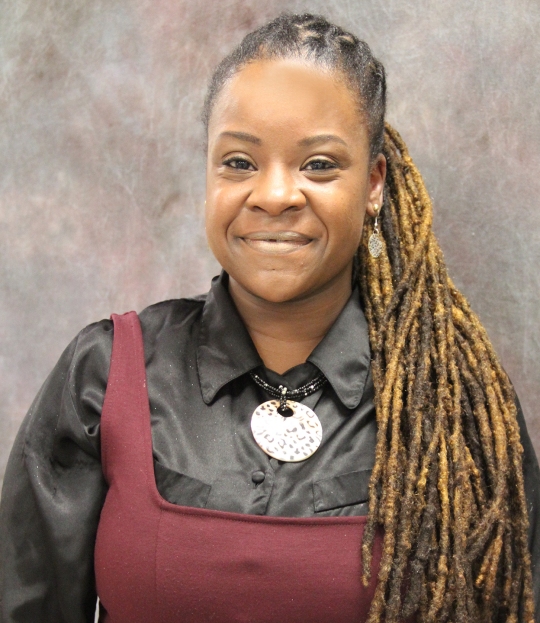 Tiffany Taylor, a chemistry teacher at St. Charles High School.
Tiffany Taylor, a chemistry teacher at St. Charles High School.LA PLATA, Md. (Feb. 11, 2016)—Tiffany Taylor, a chemistry teacher at St. Charles High School, was recently named a recipient of the National Science Teachers Association (NSTA) Robert E. Yager Foundation Excellence in Teaching Award. The award is given annually to six science teachers nationwide who demonstrate excellence in teaching and innovation in the field of science education. Eligible awardees include science teachers who work with students in grades kindergarten through 12.
Taylor has been teaching with Charles County Public Schools for the past five school years and started her career at Mattawoman Middle School, where she taught life and physical sciences. She transitioned to the high-school level in 2014 when St. Charles High School first opened for students. Taylor said she is humbled by her selection for a national award.
“I never thought I would be chosen for a highly sought after National award. Not because I am a poor educator, but because the pool of great teachers is so large. It goes to show, even after 11 years of teaching, that the only way you won’t get something is to do nothing,” Taylor said.
As an award recipient, Taylor was invited to attend the NSTA’s National Congress on Science Education in Denver this summer to present. During the Congress, she will be honored during a formal award presentation ceremony. The award honors Robert Yager, a retired professor of science education at the University of Iowa and the Iowa Academy of Education who spent his career advocating for science education, inquiry-based teaching methods for students and making science education accessible for all students.
Recipients are selected by an awards committee based on criteria that includes excellence in the field of science education; effective planning and presentation skills; the ability to motivate and challenge students; proficiency in science education; participation in professional growth and leadership roles; and demonstrated support of the next generation science standards.
Taylor’s career in science education started in a Prince George’s County Public Schools Biology classroom in 2005. It was her first year as a teacher after a career change from working in a pharmaceutical lab and Taylor said she used experiences from her former career to connect her students with classroom content. “My experiences opened the door to their curiosity about Biology and thus engaged their desire to learn more, even beyond the walls of the classroom,” she said. One of her priorities as a teacher is to engage the curiosity of her students through science. To support this goal, Taylor incorporates technology into her lessons and provides students with access to several hands-on activities so they can learn by doing.
She attends workshops at NASA Goddard Space Flight Center and uses her experiences to develop activities for her classes. She recently went to a workshop at the Milwaukee School of Engineering to learn about molecular modeling and three-dimensional printing. Taylor incorporated what she learned in to a lesson on molecular designs in which students had to present on the biological action of a molecule based on its structure.
These activities help support another goal Taylor has as a teacher: building student engagement. “All of these experiences of enriching students’ learning with hands-on and inquiry activities has allowed me to increase my students’ engagement in the sciences. By presenting them with these opportunities, we can then have more in depth conversations about content in the classroom,” she said.
Taylor applied for the award earlier this school year and received several letters of recommendation from colleagues in support of her application. Monique Wilson, director of the James E. Richmond Science Center, first met Taylor when she was teaching at Mattawoman. In her letter of support for Taylor’s application, Wilson describes her as an enthusiastic teacher who puts the love of student learning at the forefront of all that she does.
“In the classroom Miss Taylor motivates and challenges her students. Over the years, she has shown enthusiasm, extreme content knowledge and the love of students and learning. She integrates music, robotics and poetry to stimulate her students, and expects them to speak and work like a scientist. In the classroom Miss Taylor motivates and challenges her students,” Wilson wrote.
Taylor will also receive a $1,000 award, travel expenses toward attending the NSTA National Congress on Science Education and a plaque. Taylor has a bachelor’s degree in Biology and a master’s degree in curriculum and instruction with a concentration in educational technology. In 2014-15, Taylor served as a science, technology, engineering and mathematics (STEM) cohort at the NASA Goddard Space Flight Center in which she worked with other teachers to build lessons for use by the Maryland State Department of Education.
In 2015, Taylor attended a Modeling the Molecular World workshop at the Center for Biomolecular Designs at the Milwaukee School of Engineering and worked with biochemists. She is also active in the American Chemistry Society as a ChemClub Sponsor and received a Hach Professional Development Grant from the organization last year.


